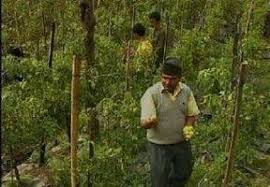In the hills of East Sikkim, Dhanpati Sapkota has transformed his family’s traditional farming practices into a successful organic venture. His journey from growing basic crops like rice and maize to pioneering sustainable horticulture has not only boosted his income but also inspired many in his community. Through innovation and dedication, Dhanpati has turned his modest farm into a model of organic farming, showing how knowledge and perseverance can lead to remarkable change.
A Simple Start
Dhanpati’s story begins in the small village of Chota Singtam, where farming was a way of life. His family, like many others, relied on cultivating paddy and maize for their livelihood. These were the crops that sustained them, but as Dhanpati worked the fields day after day, he felt a desire to do more. He didn’t want to just survive on what the land gave; he wanted to thrive, and help others do the same.
This curiosity led him to take a life-changing step—a step that would transform not only his farming methods but his entire life.
The Turning Point: Learning New Ways
In 2002, Dhanpati attended a three-day training program on organic farming in Marchak. For the first time, he was exposed to concepts that extended far beyond the traditional farming he had grown up with. The training focused on organic practices, a method of farming that doesn’t rely on chemicals but instead harnesses the natural elements for growth. Intrigued by the possibilities, he took it further by enrolling in an 11-day intensive course in Uttaranchal. This second experience opened his eyes even wider.
When he returned home, he wasn’t the same farmer who had left his fields. Armed with new knowledge, Dhanpati was eager to put into practice what he had learned. He began experimenting on his two acres of land, diving into horticultural crops. The fields that once only grew paddy and maize were soon bursting with cherry peppers, tomatoes, cauliflower, and broccoli.
A Bold Move into Horticulture
Dhanpati’s first harvest after embracing organic farming techniques was nothing short of remarkable. From just 1,900 seeds of cherry peppers, he harvested 19 quintals, earning ₹1.52 lakh. This wasn’t just a bumper crop—it was a signal that his new approach was working. Encouraged by the success, he expanded his efforts.
He took a leap of faith into cultivating off-season tomatoes, and this time, his yield was even more impressive. From a single tomato plant, he managed to harvest 40 kilograms of fruit, a figure far beyond the norm. By the end of the season, he had sold 97 quintals of tomatoes, bringing in ₹1.94 lakh. His annual income from horticulture soared to ₹2.5 lakh, marking a significant rise in his earnings compared to his earlier traditional farming days.
Discovering the Jukuni Pharsi
In 2004, Dhanpati ventured beyond the borders of Sikkim in search of new ideas. On a trip to Kathmandu, Nepal, he came across an unusual crop—a cucumber-shaped pumpkin known locally as the Jukuni Pharsi. It stood out to him, and he decided to take its seeds back home to experiment. Little did he know, this discovery would soon become a local favorite.

He began cultivating the pumpkin on his farm, and the results were impressive. The locals took notice of this unique vegetable, and soon, it earned the nickname “Sapkota Pharsi” in honor of the man who introduced it. The pumpkin not only diversified his crops but also brought in substantial income, fetching him ₹90,000 from its sale. It became another symbol of Dhanpati’s growing reputation as an innovative farmer.
A Commitment to Sustainability
Dhanpati’s journey wasn’t just about increasing his crop yield. He was deeply committed to making his farming practices more sustainable. Realizing the importance of integrating livestock with his crop cultivation, he took training in animal husbandry at Karfectar, Jorethang. Today, his farm is home to five cows, three of which are milk-producing. This allows him to sell around 20 liters of organic milk daily, further diversifying his income.
What makes Dhanpati’s approach to farming unique is how he connects the dots between animal husbandry and soil health. The manure from his cows is a critical part of his farming system. It enriches the soil, making it fertile and ready for organic crops. To further boost soil quality, he set up a vermicomposting unit, which allows him to produce nutrient-rich compost from organic waste. This holistic approach to farming creates a cycle of sustainability where nothing goes to waste.
Overcoming Challenges: Marketing and Distribution
As Dhanpati’s crops began flourishing, a new challenge emerged—how to get his produce to the market. Marketing and transportation are hurdles for many small-scale farmers in the region, and Dhanpati was no exception. However, he saw a way forward by focusing on scaling production to meet the market’s demands.
Thanks to the support from the State Horticulture Department, a Farm Handling Unit was established under the Technology Mission. This unit made it possible for Dhanpati to streamline the selling of his produce directly from the farm, cutting down on transportation costs and ensuring that his vegetables reached consumers at peak freshness.
Sharing Knowledge and Inspiring Change
While Dhanpati’s success as a farmer is impressive, what makes his story even more powerful is his willingness to share what he’s learned. He believes that knowledge should not be hoarded, especially when it can help others improve their lives. Over the years, Dhanpati has made it a point to mentor younger farmers in his community. His focus is on teaching them the importance of organic farming, not just for profit but for the long-term health of the land and the people who depend on it.
By helping others adopt organic methods, Dhanpati is contributing to a larger movement in Sikkim, which has positioned itself as India’s first fully organic state. His work is not just about personal achievement—it’s about ensuring that the region as a whole can thrive through sustainable agricultural practices.
Looking to the Future
Dhanpati’s journey from a traditional farmer to an organic farming innovator is a story of growth, resilience, and the power of learning. His work stands as a reminder that the path to success is often paved with curiosity and the willingness to embrace new ideas.
Today, Dhanpati continues to cultivate his land with the same passion that fueled his early days of experimentation. He looks toward the future with a vision of expanding organic farming in his region, inspiring others to take the leap into sustainable practices. His journey is far from over, and as he nurtures the land he loves, he’s also planting the seeds of change for future generations.
Dhanpati Sapkota has not only grown crops but a legacy—one that will continue to bloom long after the harvests are done.






